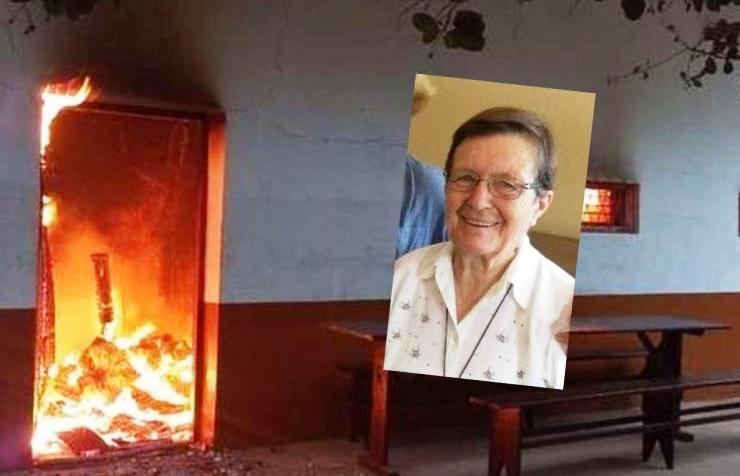During the night, an armed group attacks the mission of Chipene, a small village on the border between the provinces of Cabo Delgado and Nampula in northern Mozambique. Sister Maria De Coppi, a Comboni Sister, was killed. She had lived in the country for 59 years. “I experienced beautiful and difficult times in this country: first the colonial times, then the war followed by peace and, today, unfortunately, a time of terrorism”.
They arrived at the mission around nine in the evening on pickup trucks and started shooting and throwing grenades. One commando entered the nuns’ house, shooting at everything they saw. In the shooting, Sister Maria is hit by a bullet in the head. Another group of rebels set fire to the hospital and the nearby church. The raid ended around 11 pm, after about two hours. Only much later did the government officials arrive. Rebel groups had been active in the area for some time. The Islamic State claimed responsibility for the attack.
Sister Maria De Coppi, an 83-year-old Comboni missionary Sister, had lived for 59 years in Mozambique having gone there in 1963 while still very young.
During the years of mission and services offered to the local population, Sister Maria had also become a Mozambican citizen and she felt “part of this land and this people in the midst of whom I lived my life”.
She said: “I have experienced beautiful and difficult times in this country: first the colonial times, then war followed by a time of peace and, today, unfortunately, a time of terrorism”.
She continues: “The last two years have been very tough. In the north of the country, there is a war over gas fields and people are suffering and fleeing: in my parish, there are 400 families who come from the war zone. Then came the cyclone. Finally, last year the drought lasted for a long time. ”
The parish of Chipene, in the diocese of Nacala, Nampula Province, in the north of the country extends for 3 thousand square kilometres and has no asphalt roads. The population is plagued by hunger, ignorance, war and floods, with an average life expectancy of 40 years. The parish hosts displaced people fleeing clashes between the Rwandan army and the military on the one hand and armed groups fighting the government on the other, and has schools, dormitories and other recently inaugurated facilities. At the time of the attack, about eighty boys and girls living at the mission managed to escape.
The hope and testimony of Jesus in the poorest places on earth have always been the characteristics that accompanied Sister Maria throughout her life: “I try to be close to the people above all by listening to what they tell me. Despite material poverty, listening to others remains a great gift, it shows you respect their dignity “.
The bishop of the Diocese of Nacala, Alberto Viera recalled: “Sister Maria had repeatedly denounced the war, exploitation and terrorism in Mozambique and the suffering of the people”.
The community of Chipene had four nuns and two fidei donum priests, who miraculously escaped the attack.
The province of Nampula has been affected by the ongoing insurrection in the neighbouring province of Cabo Delgado. Fighting erupted in Mozambique’s Cabo Delgado region in 2017 when a group calling itself al-Shabab – unrelated to the Somali group of the same name – attacked towns in the region.
After the rebels seized the city of Palma in early 2021, troops from neighbouring countries arrived in the country to help the Mozambican army.
About 2,000 soldiers from eight Southern African Development Community (SADC) nations, known as the SADC Mission in Mozambique (SAMIM), were deployed on July 15, 2021. Rwanda, a non-SADC member, had previously sent 1,000 soldiers to Cabo Delgado, after an agreement with Mozambique.
The insurgents are known for their brutal methods, including burning villages and beheading civilians, and at least 4,000 people have died in the conflict. The International Organization for Migration estimates that over 900,000 people have had to flee their homes since the start of the conflict.
The Catholic Bishops’ Conference of Southern Africa issued a Sept. 7 statement expressing its “deep sorrow” over the murder of the Sister and said they were increasingly concerned about the safety of priests and nuns in the area.
“There is nothing one can say at this moment to console you except to assure you that we grieve with you,” the statement said.
“At this challenging time, we try to hang on to the words of Jesus, who promises those who mourn while believing in him that they shall be comforted,” the letter continued.
They said Sister De Coppi’s life, like so many others before her, has been “brutally terminated out of greed and intolerance of freedom of belief.” The bishops’ conference added the nun died “a martyr’s death,” noting that over six decades, the nun never abandoned the poor and destitute.
On 9 September last, Sister Maria was buried in Caparica cemetery east of Nampula where many Comboni sisters and brothers rest, having carried out their mission in this land so rich and complex.
(C.C.)






